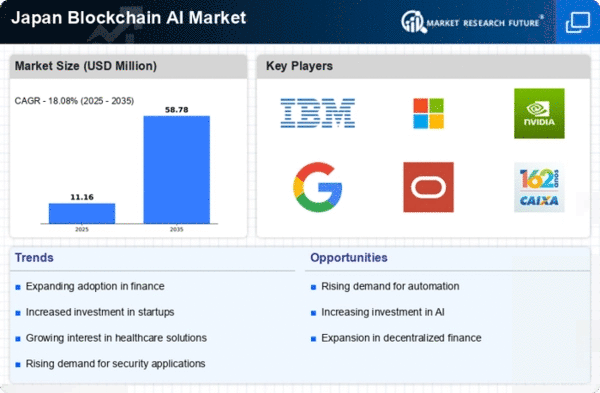Rising Demand for Data Security
The Blockchain AI market in Japan is experiencing a notable surge in demand for enhanced data security solutions. As cyber threats become increasingly sophisticated, organizations are seeking robust mechanisms to protect sensitive information. Blockchain technology, with its decentralized nature, offers a promising solution by ensuring data integrity and transparency. According to recent estimates, the cybersecurity market in Japan is projected to reach approximately $20 billion by 2025, indicating a strong correlation with the growth of blockchain ai applications. This rising demand for data security is likely to drive innovation and investment in the blockchain ai market, as companies strive to leverage AI capabilities to bolster their security frameworks.
Emergence of AI-Driven Analytics
The rise of AI-driven analytics is reshaping the landscape of the Blockchain AI market in Japan. Businesses are increasingly utilizing AI to analyze vast amounts of data generated by blockchain networks, enabling them to derive actionable insights and make informed decisions. This trend is particularly relevant in sectors such as finance and healthcare, where data-driven decision-making is crucial. The analytics market in Japan is expected to grow at a CAGR of around 15% through 2025, indicating a strong demand for AI solutions that can be integrated with blockchain technology. As organizations seek to enhance their analytical capabilities, the blockchain ai market is likely to see substantial growth.
Government Initiatives and Support
The Japanese government is actively promoting the adoption of blockchain technology across various sectors, which significantly impacts the Blockchain AI market. Initiatives aimed at fostering innovation and technological advancement are being implemented, including funding programs and regulatory frameworks that encourage research and development. For instance, the Ministry of Economy, Trade and Industry (METI) has launched several projects to explore the potential of blockchain in enhancing supply chain transparency. Such government support is expected to catalyze growth in the blockchain ai market, as businesses are incentivized to integrate AI with blockchain solutions to improve operational efficiency and competitiveness.
Growing Interest in Smart Contracts
Smart contracts are gaining traction in Japan, which is likely to propel the Blockchain AI market forward. These self-executing contracts, with the terms of the agreement directly written into code, offer a level of automation and efficiency that traditional contracts cannot match. The financial services sector, in particular, is exploring the use of smart contracts to streamline transactions and reduce the need for intermediaries. As the market for smart contracts is projected to grow significantly, with estimates suggesting a value of over $300 million by 2026, the blockchain ai market stands to benefit from the increased adoption of these innovative solutions.
Integration of AI in Supply Chain Management
The integration of AI with blockchain technology is transforming supply chain management in Japan, thereby influencing the Blockchain AI market. Companies are increasingly recognizing the potential of combining AI's predictive analytics with blockchain's traceability features to optimize logistics and inventory management. This trend is particularly evident in the manufacturing sector, where firms are leveraging these technologies to enhance operational efficiency and reduce costs. Reports suggest that the use of AI in supply chain processes could lead to a reduction in operational costs by up to 30% by 2025. Consequently, the blockchain ai market is likely to benefit from this integration as businesses seek to harness the advantages of both technologies.
















